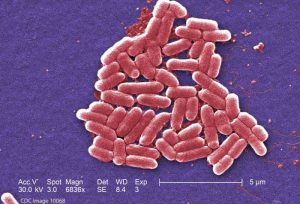E. coli infections can cause severe illness that is characterized by abdominal cramping and diarrhea that is sometimes bloody. The symptoms can last for days and be accompanied by vomiting and, sometimes, a mild fever. The illness is and feels serious, but patients should use caution when seeking treatment because some medications including antibiotics and antidiarrheals can make it worse, according to public health officials.
 Specifically, treatment with antibiotics can lead to hemolytic uremic syndrome (HUS) which impairs kidney function and can lead to kidney failure, stroke, seizure and coma. Treatment for HUS requires hospitalization and includes, blood transfusions, plasma exchange and dialysis.
Specifically, treatment with antibiotics can lead to hemolytic uremic syndrome (HUS) which impairs kidney function and can lead to kidney failure, stroke, seizure and coma. Treatment for HUS requires hospitalization and includes, blood transfusions, plasma exchange and dialysis.
All three patients in a current Wellesley, Mass. E. coli outbreak developed HUS. As did five of the 18 people sickened in a recent E. coli outbreak associated with Bar-B-Q Shack in Toccoa, Ga.
In DuPage County, IL where as many as 10 people may have contracted E. coli infections from food they ate at Los Burritos restaurant in Lombard, health officials offered the following advice: “Persons who exhibit any of the symptoms of E. coli O157:H7 are advised to contact their physician to arrange for appropriate testing and treatment, as indicated. Antibiotics should not be used to treat this infection. There is no evidence that treatment with antibiotics is helpful, and taking antibiotics may increase the risk of hemolytic uremic syndrome (HUS). Before using antidiarrheal agents such as loperamide (Imodium®) or diphenoxylate with atropine (Lomotil®), contact your physician, since antidiarrheal agents can prolong illness in persons with E. coli O157:H7, and should be avoided.”




